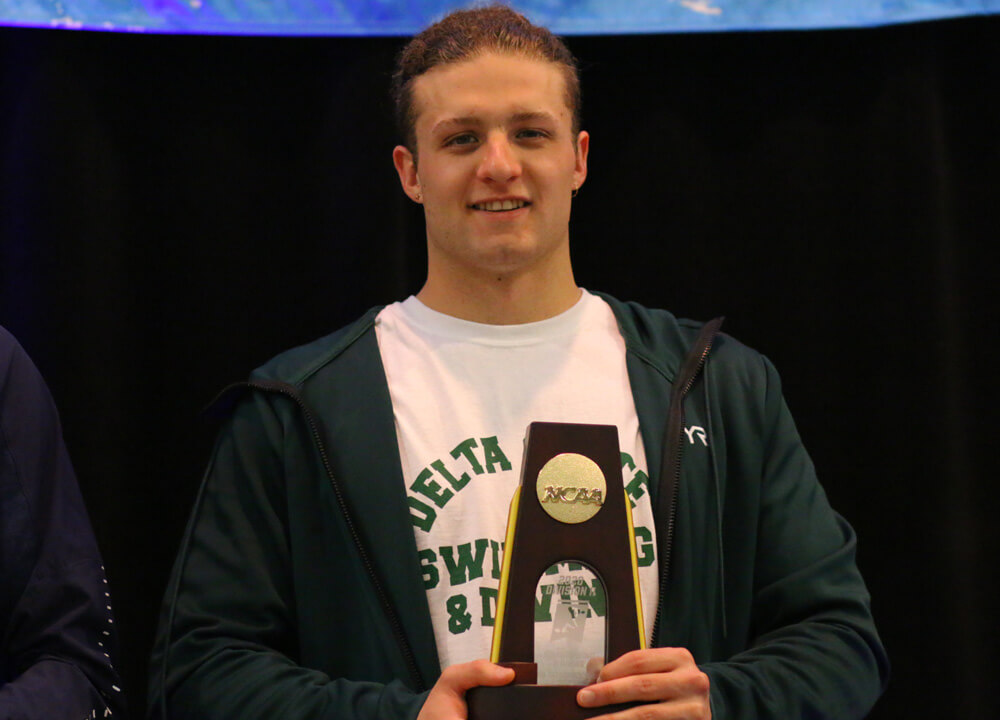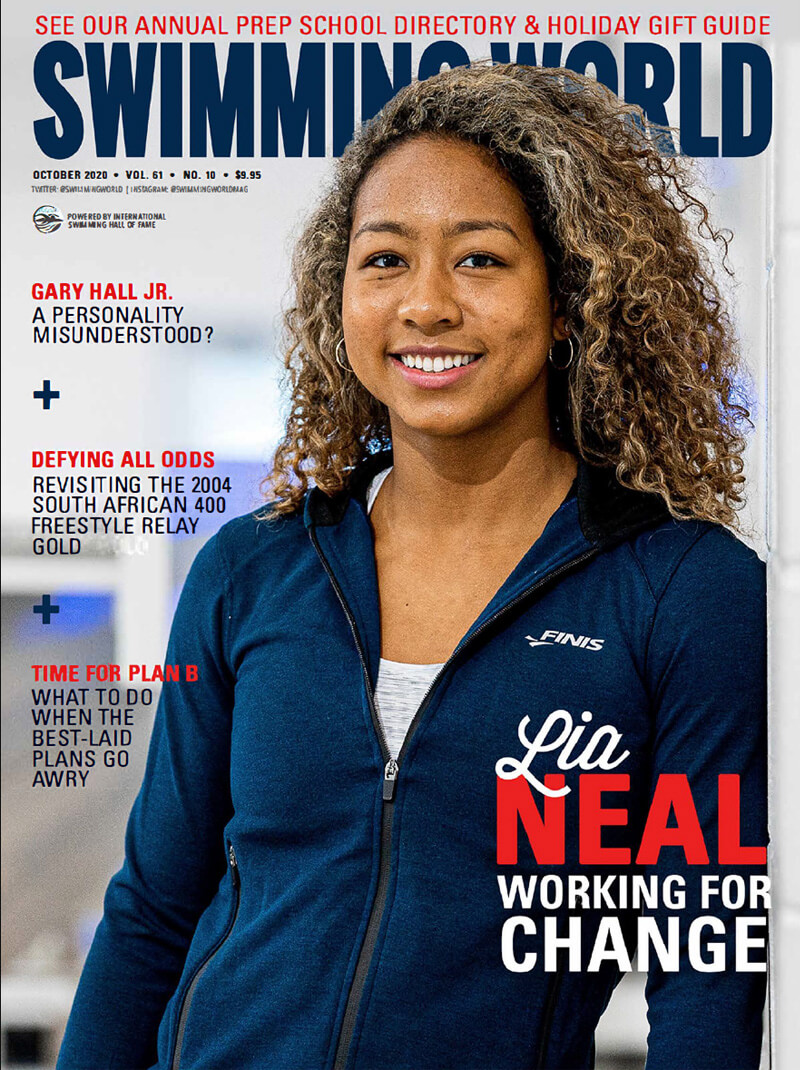Swimming World Presents – How They Train: Delta State’s Emanuel Fava

The latest issue of Swimming World Magazine
is now available for download in the Swimming World Vault!
Non-Subscribers Can Download This Issue Here
How They Train: Delta State’s Emanuel Fava
By Michael J. Stott
At six feet tall, Emanuel Fava from Turin, Italy has bolstered Delta State swimming in a big way. Influenced by his prior friendship with team members, he began school in January 2019 and immediately qualified for the NCAA Division II Championships.
In just 15 months of collegiate competition, he has become a seven-time NCAA All-American and D-II champion in the 200 yard IM (1:44.10). In addition to that event, he holds school records in the 200 back (1:44.44) and 200 medley relay (1:26.03 with a 21.66 backstroke leg), and he’s been a seven-time New South Intercollegiate Swim Conference champion. Fava was primed to
claim more accolades last March until coronavirus concerns canceled the D-II national championships with Delta State’s men in second place after the first day.
“Emanuel is a former gymnast and has very good body control in the gym and in the water,” says his coach, Dan’l Murray. “He is athletic and one of our stronger athletes. In the pool, he is always conscious of his technique and will not abandon form for speed. Very coachable, he has a strong commitment to doing things right all the time. Emanuel does a very good job balancing race details, technique and effort on anything he does in the water.
“He is a good communicator with quite a sense of humor. Emanuel asks good questions for clarification before doing sets and on occasion to delay the start of the set. He is a very good teammate and gets along with everyone,” says Murray.
COACH MURRAY ON DELTA STATE TRAINING
We have three decidedly different groups. Emanuel is in our sprint group. The training is regularly on the higher end of fast-effort repeats, lactate tolerance and production, race pace, skill acquisition work, power sessions and speed endurance throughout the year.
This group has higher quality and intensive efforts, and is lower on volume compared to the others. It is not for everyone. These athletes must have a strong desire to improve their kicking skills. If they are able to think and race at the same time and are willing to run through walls, they will have success in this group.
To access the training sets coach Murray uses with Emanuel Fava’s sprint group,
Check out the full article in Swimming World’s October 2020 issue, available now!
 [PHOTO CREDIT: BECCA WYANT/FINIS, INC. PHOTOGRAPHY]
[PHOTO CREDIT: BECCA WYANT/FINIS, INC. PHOTOGRAPHY]
Get Swimming World Magazine and Swimming World Biweekly FREE When You
Become A Member of the International Swimming Hall of Fame
New! 30 Day Membership to ISHOF AND Digital Swimming World Subscription for just $10 a month!
Want more? Get a 1 Year ISHOF Family Membership With Swimming World Print AND Digital Subscription Order Now!
Non-Subscribers can click here to download this issue for only $5.94
Swimming World Magazine October 2020 Issue
FEATURES
012 WORKING FOR CHANGE
by David Rieder
In response to the Black Lives Matter movement, elite swimmers Lia Neal and Jacob Pebley created Swimmers for Change to promote diversity and to make swimming a more inclusive sport and a more inclusive community.
020 THE TROUBLE WITH SPRINTERS (Part 4): REVISITING THE CAREER OF GARY HALL JR.
by Bruce Wigo
As Dave Marsh and Mike Bottom explained in the previous issue, if there is a problem with sprinters, it is because, mentally, they are wired differently from other athletes. Potential trouble then seems to start when coaches and administrators are unable to understand their behavior and their needs. But while causing trouble for some, the aquatic sports world would not be where it is today without the rebellious personalities of sprinters.
026 DEFYING ALL ODDS
by John Lohn
There is no doubt that the Summer of 2004 remains the defining moment in South African swimming history. That’s when Roland Schoeman, Lyndon Ferns, Darian Townsend and Ryk Neethling shocked the world with their Olympic gold medal and world record-setting performance in the men’s 400 meter freestyle relay in Athens.
COACHING
010 PLAN B: WHEN BEST-LAID PLANS GO AWRY
by Michael J. Stott
Bolstering swimmers—in sickness and health—is part and parcel of a coach’s job. When done right, everybody wins.
038 SWIMMING TECHNIQUE CONCEPTS: DR. ANDERS ERICSSON’S CONCEPT OF DELIBERATE PRACTICE
by Rod Havriluk
Dr. Anders Ericsson left a vital legacy for athletes striving to become experts. His deliberate practice concept specifies the key components that help athletes progress to an expert level. The success of deliberate practice suggests that a coach prioritize deliberate practice strategies in team training and relegate conditioning to secondary importance.
040 SPECIAL SETS: MICHAEL PHELPS—FROM GOOD TO GREAT
by Michael J. Stott
The sets included in this article are taken from the 2001-02 short course and early long course season. They are a representative sample of Coach Bob Bowman’s early program in developing Michael Phelps as the greatest Olympic swimmer of all time.
043 Q&A WITH COACH DAN’L MURRAY
by Michael J. Stott
044 HOW THEY TRAIN EMANUEL FAVA
by Michael J. Stott
TRAINING
030 DRYSIDE TRAINING: NO SEASON, NO RACING…NOW WHAT?
by J.R. Rosania
This pandemic has shut down our competition calendar. Whether it’s a high school, college, professional or Olympic season, we need to perform exercises that will help us stay strong, fast and explosive.
JUNIOR SWIMMER
046 UP & COMERS: EMILY WAY
by Shoshanna Rutemiller
COLUMNS & SPECIAL SECTIONS
008 A VOICE FOR THE SPORT
015 HOLIDAY GIFT GUIDE
023 DID YOU KNOW? MARY HOERGER
031 PREP SCHOOL DIRECTORY
042 HASTY HIGH POINTERS
047 GUTTERTALK
049 PARTING SHOT
Swimming World is now partnered with the International Swimming Hall of Fame. To find out more, visit us at ishof.org



